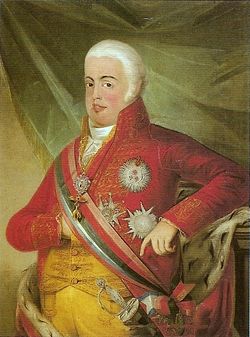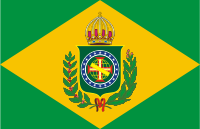John VI of Portugal
| John VI | |
|---|---|
| King of Portugal and the Algarves (more...) | |
 |
|
| Reign | 20 March 1816 – 10 March 1826 |
| Predecessor | Maria I |
| Successor | Peter IV |
| Consort | Charlotte of Spain |
| Issue | |
| Maria Teresa, Princess of Beira Maria Isabel, Queen of Spain Peter IV Infanta Maria Francisca Infanta Isabel Maria Michael Infanta Maria da Assunção Infanta Ana de Jesus Maria, Duchess of Loulé |
|
| Royal house | House of Braganza |
| Father | Peter III |
| Mother | Maria I |
| Born | 13 May 1767 Lisbon |
| Died | 10 March 1826 (aged 58) Lisbon |
John VI (13 May 1767 – 10 March 1826) (Portuguese João, pronounced [ʒʊˈɐ̃ũ]), the Clement (Port. o Clemente), King of the United Kingdom of Portugal, Brazil and the Algarves (later changed to just King of Portugal and the Algarves, after Brazil was recognized independent in 1825) was born in Lisbon in 1767. John was the 27th (or 28th according to some historians) Portuguese monarch.
Contents |
Early life and regency
John was the second son of Maria Francisca of Portugal, the then Princess of Brazil and her husband (and uncle), Infante Pedro, her prince consort. His mother ascended the throne of Portugal in 1777. John's elder brother Joseph died in 1788, so John became the heir apparent and received the title of prince of Brazil.
In 1799 John assumed the reins of government as prince regent in the name of his widowed mother, who had declined into mental illness (perhaps due to porphyria). He retained this position until his mother's death in 1816. John had been brought up in an ecclesiastical atmosphere and, being naturally of a somewhat weak and helpless character, was ill adapted for the responsibilities he was called on to undertake. His wife, Charlotte of Spain, dominated him. In 1807, Portugal was invaded by France. At the urging of Britain, the whole Portuguese royal family fled to Brazil, accompanied by an escort of British ships. His court in exile was established in Rio de Janeiro.
King of Portugal
In 1816 John was recognized as king of Portugal after his mother's death but he continued to reside in Brazil, which he had raised to the status of a kingdom on 16 December 1815. The consequent spread of dissatisfaction in Portugal resulted in the peaceful revolution of 24 August 1820, and the proclamation of a constitutional government, to which John swore fidelity on his return to Portugal in 1821. In the same year, and again in 1823, he had to suppress a rebellion led by his younger son Miguel, whom he was ultimately compelled to banish in 1824.
Meanwhile his elder son and heir, Pedro, declared Brazilian independence from Portugal on 7 September 1822, and subsequently declared himself Emperor Pedro I. John refused to recognize Brazilian independence until 29 August 1825, when he restored Pedro to the succession in the belief that Brazil and Portugal would be reunited in a dual monarchy federation after his own death. John died at Lisbon on 26 March 1826, and was briefly succeeded by Pedro (as King Pedro IV). Recent tests made to John's intestines, which had been kept buried on a vase, demonstrated that he may have died due to arsenic poisoning. His nemesis, Napoleon, may have also suffered a similar fate.
A fictionalized version of much of his life is depicted in the Brazilian movie Carlota Joaquina - Princesa do Brasil.
Marriages and descendants
John married Charlotte of Spain (25 April 1775-7 December 1830 in 1785 and had several children:
| Name | Birth | Death | Notes |
|---|---|---|---|
| Maria Teresa, Princess of Beira | 29 April 1793 | 17 January 1874 | Married first her cousin Pedro Carlos de Borbón y Bragança, Infante of Spain and Portugal and second to Carlos, Infante of Spain, widower of her sister Maria Francisca. |
| Francis Anthony Pius, Prince of Beira | 21 March 1795 | 11 June 1801 | |
| Infanta Maria Isabel | 19 May 1797 | 26 December 1818 | Married Ferdinand VII, King of Spain. |
| Pedro IV of Portugal, I of Brazil | 12 October 1798 | 24 September 1834 | Stayed in Brazil after Napolean Wars in Spain. Proclaimed the Independence of Brazil in 1822 and became its first monarch as Emperor Peter I. He was also King of Portugal as Peter IV in 1826. |
| Infanta Maria Francisca | 22 April 1800 | 4 September 1834 | Married Infante Carlos of Spain (his first marriage). |
| Infanta Isabel Maria | 1801 | 1876 | |
| Michael I | 26 October 1802 | 14 November 1866 | Known by the Liberals as the Usurper, he was King of Portugal between 1828 and 1834. He was forced to abdicate after the Liberal Wars. |
| Infanta Maria da Assunção | 1805 | 1834 | |
| Infanta Ana de Jesus Maria, Duchess of Loulé | 1806 | 1857 | Married Nuno José Severo de Mendoça Rolim de Moura Barreto, Marquis and then Duke of Loulé and had issue. |
Ancestors
| John VI of Portugal | Father: Peter III of Portugal |
Father's father: John V of Portugal |
Father's father's father: Peter II of Portugal |
| Father's father's mother: Maria Sophia of Neuburg |
|||
| Father's mother: Mary Anne of Austria |
Father's mother's father: Leopold I, Holy Roman Emperor |
||
| Father's mother's mother: Eleonore-Magdalena of Pfalz-Neuburg |
|||
| Mother: Maria I of Portugal |
Mother's father: Joseph I of Portugal |
Mother's father's father: John V of Portugal |
|
| Mother's father's mother: Mary Anne of Austria |
|||
| Mother's mother: Mariana Victoria of Spain |
Mother's mother's father: Philip V of Spain |
||
| Mother's mother's mother: Elisabeth of Parma |
See also
- War of the Two Brothers
- History of Portugal
- History of Brazil
References
- This article incorporates text from the Encyclopædia Britannica Eleventh Edition, a publication now in the public domain.
|
John VI of Portugal
Cadet branch of the House of Aviz
Born: 13 May 1767 Died: 26 March 1826 |
||
| Regnal titles | ||
|---|---|---|
| Preceded by Maria I as Queen of Portugal and the Algarves |
King of the United Kingdom of Portugal, Brazil and the Algarves 1816 – 1822 |
Succeeded by Peter IV |
| Brazil secedes to found the Empire of Brazil |
King of Portugal and the Algarves 1822 – 1826 |
|
|
||||||||||||||||||||
|
|||||||||||||
